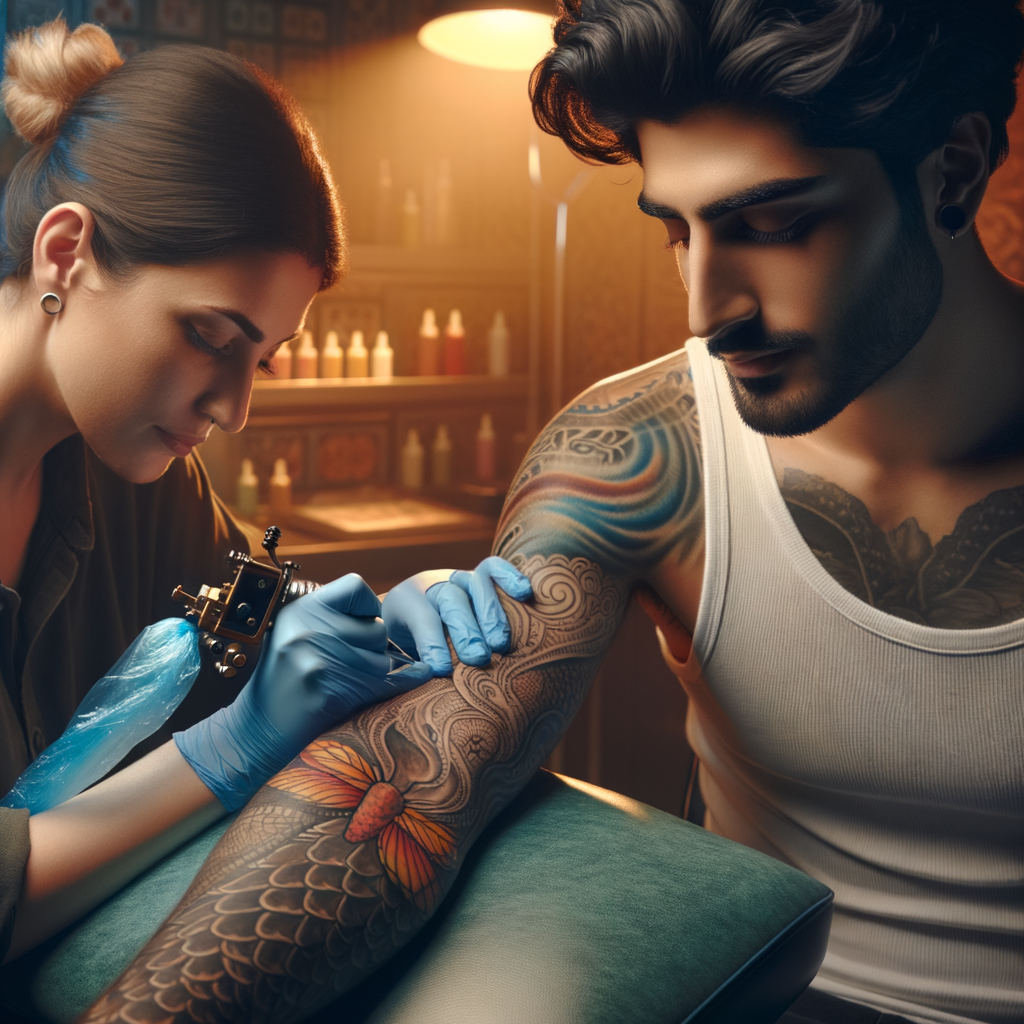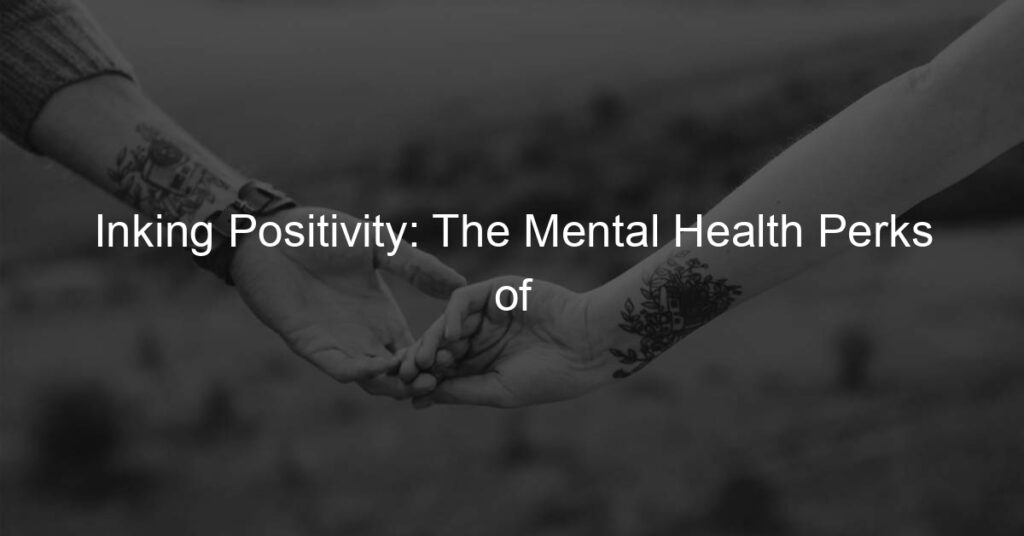
Introduction: Tattoos and Mental Wellbeing
For centuries, tattoos have been a form of human expression. They tell stories, commemorate events, and symbolize personal beliefs. But did you know that tattoos can also play a significant role in mental wellbeing? In this article, we will delve into the fascinating connection between tattoos and mental health, and explore the concept of tattoo artistry.
-
- Understanding the connection between tattoos and mental health
Many people use tattoos as a form of self-expression, a way to reclaim their bodies, or even as a therapeutic tool to cope with mental health issues. A tattoo can serve as a constant reminder of personal strength, a symbol of overcoming struggles, or a tribute to a loved one. In some cases, the process of getting a tattoo can be a cathartic experience, allowing the individual to process and express their emotions in a unique and permanent way.
-
- Exploring the concept of tattoo artistry
Tattoo artistry is more than just ink on skin. It’s a form of art that requires skill, creativity, and a deep understanding of the human body. Tattoo artists are not just technicians, but also therapists of sorts, helping their clients express their innermost feelings and experiences through their designs. The process of creating a tattoo design, choosing its location, and going through the tattooing process can be a deeply personal and meaningful journey for many people.
In the following sections, we will delve deeper into the psychological aspects of tattoo artistry, how tattoos can improve mental health, and real-life case studies that highlight the power of tattoos in promoting mental wellbeing. So whether you’re a tattoo enthusiast, a mental health professional, or just curious about the topic, stay tuned for an enlightening exploration of tattoos and mental health.
Mental Health and Tattoos: An Overview
Understanding the relationship between mental health and tattoos requires a look into both the historical perspective and current trends. This article will provide an overview of these two aspects, shedding light on how tattoos have been used as a form of self-expression and a tool for mental health improvement.
- Historical perspective of tattoos and mental health
In ancient cultures, tattoos were often used as a form of therapy. They were believed to have healing properties and were used to treat various mental and physical ailments. For example, in some Native American tribes, tattoos were used to help individuals cope with trauma and grief. They served as a physical reminder of the strength and resilience of the individual, providing a sense of comfort and reassurance.
Fast forward to the 20th century, tattoos were often associated with rebellion and non-conformity. However, many individuals used tattoos as a way to express their inner struggles and emotions. Tattoos became a form of self-expression, allowing individuals to visually represent their mental health journey.
- Current trends in tattoo artistry and mental health
Today, the connection between tattoos and mental health is more recognized and accepted. Many individuals use tattoos as a form of therapy, finding comfort and healing in the process of getting inked. Tattoos serve as a permanent reminder of their personal growth and resilience, providing a sense of empowerment and control.
According to a survey conducted in 2020, 30% of tattooed individuals stated that their tattoos represent a personal struggle or triumph over mental health issues. This shows the significant role that tattoos play in mental health, serving as a form of self-expression and a tool for healing.
Furthermore, many tattoo artists are now specializing in ‘healing tattoos’. These are tattoos that are designed to cover scars from self-harm, surgery, or trauma. The process of getting a healing tattoo can be therapeutic for many individuals, helping them reclaim their bodies and boost their self-esteem.
In conclusion, tattoos have evolved from being a form of rebellion to a tool for self-expression and mental health improvement. Whether it’s a symbol of personal growth, a reminder of resilience, or a form of therapy, tattoos play a significant role in mental health.
Tattoo Artistry Benefits: Psychological Aspects
There are numerous psychological benefits associated with tattoo artistry. Let’s explore some of them:
-
- How tattoos can boost self-esteem
Getting a tattoo can significantly boost one’s self-esteem. Tattoos are a way of taking control of one’s body and personalizing it. This act of self-ownership and self-expression can lead to increased confidence and self-esteem. A study conducted in 2016 found that women who had tattoos reported higher levels of self-esteem compared to those without.
-
- Tattoos as a form of self-expression
Tattoos are a powerful form of self-expression. They allow individuals to showcase their personality, beliefs, or experiences in a visible and permanent way. This act of self-expression can lead to feelings of empowerment and authenticity. For many, their tattoos tell a story about who they are and what they value, which can foster a strong sense of identity.
-
- Emotional healing with tattoo art
Tattoo art can also serve as a form of emotional healing. Some people choose to get tattoos as a way to cope with traumatic experiences or loss. The process of getting a tattoo can be therapeutic, providing a sense of closure or a way to honor a loved one. In fact, some therapists have started to recognize the potential of tattoo art as a form of art therapy.
In conclusion, tattoos can have a positive impact on mental health by boosting self-esteem, providing a form of self-expression, and aiding in emotional healing. It’s important to remember that everyone’s experience with tattoos is unique, and these benefits may not apply to everyone. However, for many, tattoo artistry can be a powerful tool for psychological wellbeing.
Mental Health Improvement through Tattoos: Case Studies
Now that we have a better understanding of the connection between tattoos and mental health, let’s delve into some real-life examples. These case studies will give us a clearer picture of how tattoos can be used as a tool for mental health improvement.
- Case Study 1: Tattoo art therapy for trauma survivors
Meet Jane, a survivor of a traumatic car accident. After the accident, Jane struggled with anxiety and post-traumatic stress disorder (PTSD). Traditional therapy methods provided some relief, but it wasn’t until she discovered tattoo art therapy that she truly began to heal.
She decided to get a tattoo of a phoenix rising from the ashes, symbolizing her journey of overcoming her trauma. The process of getting the tattoo was therapeutic for Jane. It allowed her to reclaim control over her body and express her resilience in a visible and permanent way.
Today, Jane is a strong advocate for tattoo art therapy. She believes that the process of getting a tattoo can be a powerful healing tool for trauma survivors.
- Case Study 2: Tattoos as a coping mechanism for mental illness
Next, let’s consider the story of John, who has been battling depression for several years. John felt isolated and misunderstood, and he struggled to communicate his feelings to others. One day, he decided to get a tattoo of a semicolon on his wrist.
The semicolon tattoo is a symbol used in the mental health community to represent the decision to continue life, despite struggles with mental health. For John, this tattoo served as a daily reminder of his strength and resilience. It also opened up conversations about mental health with others, helping him feel less alone.
John’s story highlights how tattoos can serve as a coping mechanism for mental illness. They can provide a tangible reminder of one’s strength and resilience, and open up conversations about mental health.
These case studies highlight the potential of tattoos as a tool for mental health improvement. Whether it’s through tattoo art therapy or as a coping mechanism, tattoos can provide a unique and powerful way to express one’s journey and resilience.
Tattoo Artistry and Self-Expression
Tattoos are more than just ink on skin; they are a powerful form of self-expression. They allow individuals to tell their stories and play a significant role in identity formation. Let’s delve deeper into understanding tattoos as a form of expression.
Understanding Tattoos as a Form of Expression
When we talk about tattoos, we often think about the beautiful designs and vibrant colors. However, there’s a lot more to tattoos than just their aesthetic appeal. They are a unique form of self-expression that allows individuals to communicate their personal narratives and identities.
-
- How tattoos allow individuals to tell their stories
Every tattoo has a story behind it. It could be a memory, a tribute, or a symbol of a personal journey. For instance, a person might get a tattoo of a butterfly to symbolize their transformation and growth. Or, someone might get a tattoo of a date to commemorate a significant event in their life. These tattoos serve as visual narratives, allowing individuals to express their experiences and emotions in a unique and personal way.
-
- The role of tattoo art in identity formation
Tattoos also play a crucial role in identity formation. They can represent personal beliefs, values, or affiliations. For example, a person might get a tattoo of a religious symbol that represents their faith. Or, someone might get a tattoo of a cultural symbol that reflects their heritage. These tattoos not only express individuality but also create a sense of belonging and identity. They are a way for individuals to assert who they are and what they stand for.
In conclusion, tattoos are a powerful form of self-expression. They allow individuals to tell their stories and play a significant role in identity formation. So, the next time you see a tattoo, remember that it’s more than just a beautiful design – it’s a personal narrative and a symbol of identity.
Therapeutic Benefits of Tattoo Artistry
When we think of tattoos, we often think of them as a form of self-expression or a way to commemorate significant events or people in our lives. However, the artistry of tattooing can also serve as a form of therapy, offering numerous psychological benefits to those who choose to get inked.
- How Tattoo Art Can Serve as a Form of Therapy
Tattooing can be a therapeutic process for many individuals. It’s not just about the end result; the act of getting a tattoo can be a cathartic experience. The pain involved in the process can serve as a physical manifestation of emotional or psychological pain, helping individuals to confront and process their feelings. For those who have experienced trauma or loss, a tattoo can serve as a form of healing, allowing them to reclaim control over their bodies and their narratives.
- The Psychological Benefits of Getting a Tattoo
Research has shown that getting a tattoo can have numerous psychological benefits. A study conducted by the American Journal of Human Biology found that individuals who get tattoos often experience a boost in self-esteem and body image. Tattoos can serve as a visual reminder of personal strength, resilience, or growth, helping to boost confidence and self-worth.
Furthermore, tattoos can also serve as a form of self-care, allowing individuals to invest time, money, and thought into something that is purely for themselves. This act of self-care can promote feelings of self-love and acceptance, contributing to overall mental wellbeing.
While it’s important to remember that getting a tattoo is a personal decision and not a cure-all for mental health issues, the therapeutic benefits of tattoo artistry are undeniable. Whether it’s through the act of getting a tattoo or the meaning behind the ink, tattoos can offer a unique form of therapy that promotes healing, self-expression, and psychological wellbeing.
Conclusion: Embracing Tattoo Artistry for Mental Health
In this journey, we have explored the profound connection between tattoo artistry and mental health. Now, let’s summarize the key takeaways and look at the future of tattoo artistry in mental health therapy.
-
- Key takeaways on the mental health perks of tattoo artistry
Tattoo artistry is more than just skin-deep. It has been shown to provide several mental health benefits, including:
-
-
- Self-expression: Tattoos allow individuals to express their inner feelings, experiences, and identities in a unique and personal way.
- Therapeutic value: The process of getting a tattoo can be a cathartic experience, helping individuals to cope with emotional pain and trauma.
- Body positivity: Tattoos can help individuals to reclaim their bodies and boost their self-esteem.
- Community connection: The tattoo community can provide a sense of belonging and support.
- The future of tattoo artistry in mental health therapy
-
As we move forward, the role of tattoo artistry in mental health therapy is expected to grow. More and more mental health professionals are recognizing the therapeutic potential of tattoos. In the future, we may see:
-
- Integration into therapy: Tattoo artistry could become a common tool in art therapy and other therapeutic modalities.
- Professional training: Tattoo artists may receive training in mental health to better support their clients.
- Research: More research will be conducted to understand the psychological impacts of tattoos and how they can be harnessed for therapeutic purposes.
Embracing tattoo artistry for mental health is about recognizing the power of self-expression and the healing potential of art. As we continue to break down the stigmas around both tattoos and mental health, we can look forward to a future where these two fields intersect in meaningful and transformative ways.






